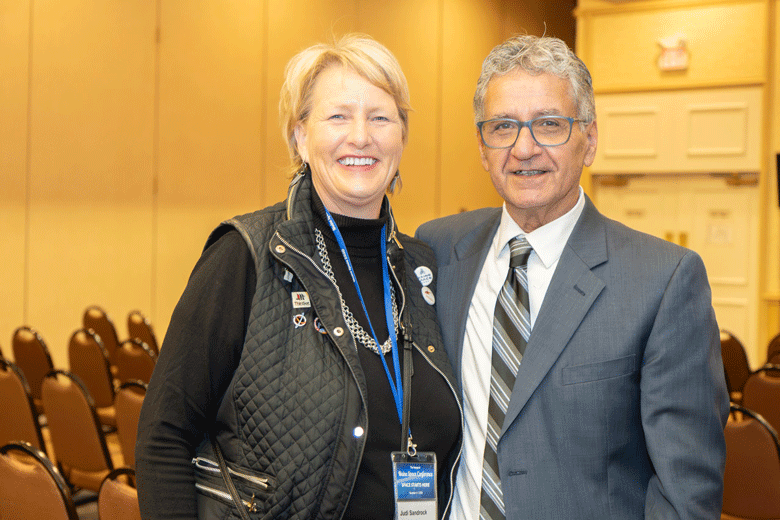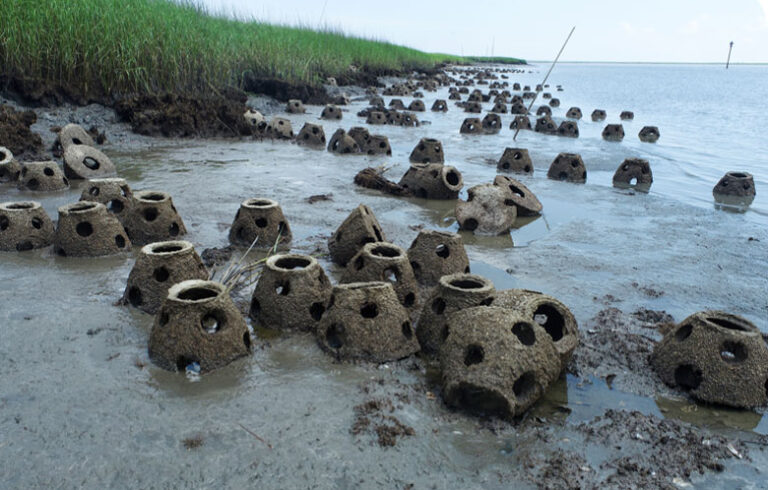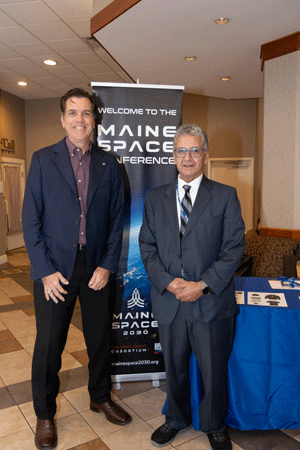
Maine’s rocky coastline isn’t only beautiful, it’s the driving force behind some of the state’s most historic, lucrative industries, like shipbuilding, fishing, and tourism. Maine’s south-facing coastline could also become the driving force behind a future—and futuristic—Maine industry, built around, and aiming for, space.
“These tiny satellites… half of them need to go into a polar orbit, going due south, or due north,” said Sascha Deri, CEO of bluShift Aerospace. “Here in Maine we have a coastline that allows us to go due south without going over people or property. You can’t do that anywhere else on the Eastern Seaboard.”
Deri spoke on a panel at the first annual Maine Space Conference, held in Portland last November, where more than 300 attendees listened to dozens of speakers including NASA’s Michael Kincaid, Maine Department of Economic and Community Development Commissioner Heather Johnson, and Terry Shehata, executive director of the Maine Space Grant Consortium.
Maine, and Washington County, are “uniquely suited” to lead…
Only a month before the event, organizers feared it would be sparsely attended, said Shehata. Then came a surge in registrations. Ultimately, it sold out.
“That shows, I think, that Maine really wants to get into the space economy,” Shehata said. “It’s happening across the world, it’s happening across Maine, and we need to be part of that development.”
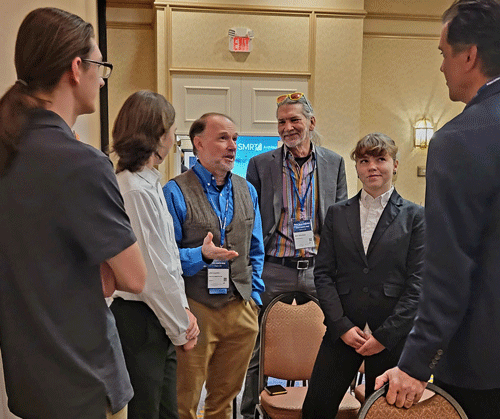
And Shehata is right, the space economy is ramping up in Maine. There are already more than 80 Maine companies involved in the aerospace industry, such as Biddeford-based Fiber Materials Inc., now part of Spirit Aerosystems. FMI manufactured a heat shield used during the Osiris-Rex mission, enabling delivery of asteroid samples to Utah at the end of a seven-year mission.
In early January, Teledyne Technologies Inc., a $5.5-billion company headquartered in California, opened an office in Maine, specifically to position itself in the state’s commercial space industry. Teledyne created infrared sensors critical to the function of the James Webb Space Telescope.
And Maine is betting there will be more. In 2022, the state enacted legislation creating the Maine Space Corporation.
“The legislature has tasked the Maine Space Corporation with developing three legs of the Maine Space Complex: a space data analytics center, a space innovation hub for research and development, and a launch site,” said Shehata. “It’s required by law to establish those.”
The Maine Space Complex will be distributed across the state, with data analytics sites at the Brunswick Landing Center for Innovation, and at universities in Orono and Portland. Potential innovation hub locations are also planned for the Loring Commerce Centre in Limestone, and for the University of Maine, the University of Southern Maine, and the Roux Institute.
Working with educational institutions and students is a high priority for Shehata, whose efforts with the Maine Space Grant Consortium encourage Maine students to consider careers in STEM fields (Science, Technology, Engineering, and Mathematics), among other things.
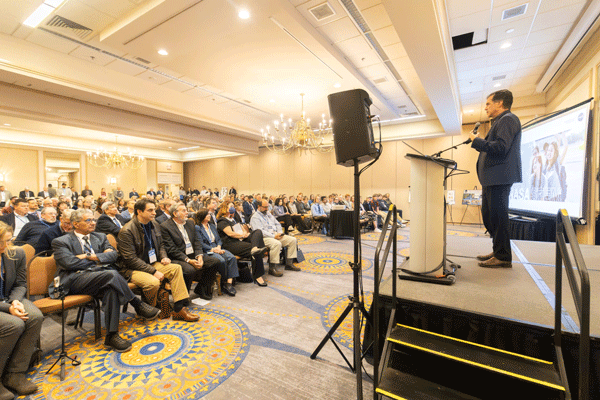
Shehata recounts a recent news story about a 10-year-old Maine boy with an incredible talent for fixing broken machines, like lawn mowers.
“I’m afraid we’re going to lose that kid when he goes to college. He’s going to move somewhere else,” said Shehata. “It’s our job to create the right infrastructure so that he can use his expertise and his knowledge here in Maine.”
Maine did lose, for a time, the expertise of Phillip Rench, a native Mainer who studied out of state and then moved up through the ranks at SpaceX, rising to the position of director of launch engineering in South Texas. In 2019 he returned to Maine, where he and his wife are in the process of developing the state’s largest observatory at Ossipee Hill Farm.
Students in Maine and around the world will be able to request astronomical observations during the day, then receive them via email that night, fully autonomously.
Rench serves on the Maine Space Corporation’s board of directors, and says he believes Maine’s economy needs something to inspire young Mainers.
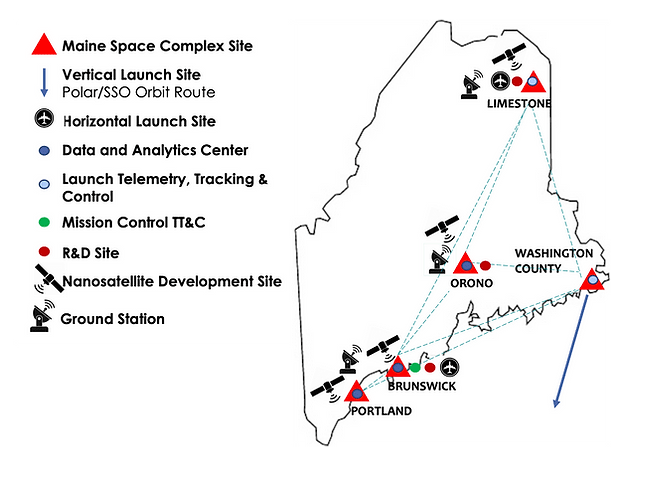
“From my perspective there is nothing more inspiring than seeing a rocket launch,” said Rench. “It’s such a powerful thing. And we’re just getting to the point where we’re actively engaged in going back to the moon. The opportunities coming up in the next decade, the potential is endless.”
The need to retain Maine’s migrating youth is one driving force behind its multi-faceted space complex strategy. No other state has a space complex, Shehata says, and by focusing on more aspects of the space economy than just rocket launches, the complex could give Maine a strategic and competitive advantage over space ports in other states, or other countries, like the one under development now in Nova Scotia.
“It’s not only about the space port. It’s about engaging Maine in all elements of the value chain, so even if a space port doesn’t exist we can still move ahead,” Shehata said.
If a Maine space port can exist, the corporation has identified three possible locations. For horizontal launches, which use large aircraft to deliver rockets into the air, the former air bases in Limestone and Brunswick both have the necessary lengthy runways. For vertical rocket launches, the type most people are familiar with, although significantly smaller, the corporation hopes to find a site in Washington County.
“These rockets are nothing like what you picture in your mind’s eye. These are not 400-foot rockets. Trees are taller than these rockets,” says Machias Town Manager Bill Kitchen, who serves on the Maine Space Complex Launch Site & Services Working Group, and other development teams. “This is not a sprawling facility, the size of this facility is going to be measured in football fields.”
Whether or not a launch site is located in Washington County, Kitchen hopes the region will play a role in Maine’s space economy, possibly in the manufacturing and building of rockets. Maine, and Washington County, are “uniquely suited” to lead, he says, “based on our geography.”
Jourdan Johnson’s Portland-based company, Space Futures Consulting, specializes in guiding companies in matters relating to international space policy, and particularly on matters of space sustainability. She agrees that Maine can be a leader in sustainable space practices.
“That’s the greatest opportunity we have in Maine with policy right now. We can make policy at the state level that will make us leaders in space sustainability,” said Johnson. “We have a legacy of Maine companies doing things the right way. I don’t see how the space industry in Maine can advance without having some aspect of sustainability. It wouldn’t be on brand for Maine if it didn’t.”
To learn more, visit: www.mainespacecorp.org/, www.mainespace2030.org/ and www.msgc.org/
